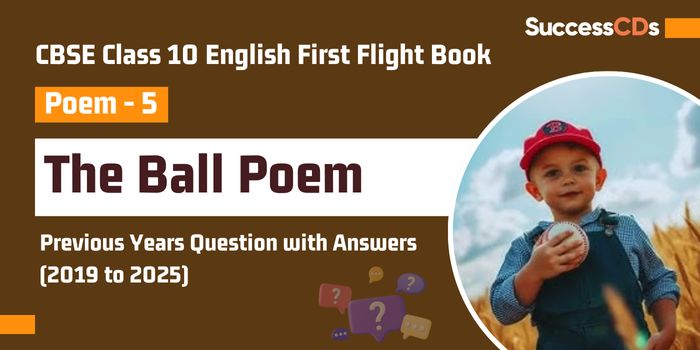CBSE Class 10 First Flight Book Poem 5 The Ball Poem Question Answers from previous years question papers (2019-2025)
The Ball Poem Previous Year Questions with Answers – Question Answers from Previous years Board Exam Question papers provide valuable insights into how chapters are typically presented in exams. They are essential for preparing for the CBSE Board Exams, serving as a valuable resource.They can reveal the types of questions commonly asked and highlight the key concepts that require more attention. In this post, we have shared Previous Year Questions for Class 10 English Poem 5, “The Ball Poem”.
Questions from the Chapter in 2025 Board Exams
Q1. The loss of the ball is a lesson to the boy. Elaborate. (The Ball Poem) [40-50 words]
Ans. The boy was playing with the ball. Suddenly, it rolled off and fell into the stream. The child had not experienced loss and this incident made him shake in grief. He stood motionless and felt helpless. However, the poet assured him that he could buy another ball. The poet says that this incident will teach the child to handle loss and to move on in life.
For All Class 10 English Lesson Explanation, summary, Character Sketch, MCQs and Previous Years Question Papers Click here
Questions which came in 2024 Board Exam
Q1. Read the following extracts and answer the questions:
No use to say ‘O there are other balls
An ultimate shaking grief fixes the boy
As he stands rigid, trembling, staring down
All his young days into the harbour where his ball went.
I would not intrude on him,
A dime, another ball, is worthless. Now
He senses first responsibility
In a world of possessions. People will take
Balls, balls will be lost always, little boy
And no one buys a ball back. Money is external
He is learning….. [2024]
(i) Which of the following best describes the speaker’s attitude towards the boy’s reaction to losing his ball?
(A) indifferent as the ball is inexpensive
(B) sympathetic, understanding the depth of the boy’s loss
(C) mocking, finding the boy’s reaction exaggerated and unnecessary.
(D) panicked, sharing the boy’s distress over the lost ball.
Ans. (B)
(ii) Comment on the use of metaphor in the above extract.
Ans. The reference to a ball is a metaphor as the poet is referring to possessions.
(iii) Explain the phrase ‘all his young days into the harbour’ with reference to the extract.
Ans. As the ball rolls down into the stream, the boy is reminded of the memories of the ball. The childhood days when he played with it.
(iv) Briefly state in about 40 words the boy’s journey from ‘shaking grief’ to ‘he is learning’ in the above extract.
Ans. It is the first instance of experiencing loss. He is trembling and unable to move due to extreme sadness of losing the ball. Gradually, he is learning to cope up with the grief and to accept the loses.
Q2. Read the following extracts and answer the questions:
And no one buys a ball back, Money is external
He is learning, well behind his desperate eyes
The epistemology of loss, how to standup. [2024]
(i) When the poet says that “no one buys a ball back”, what does he refer to in the context of the poem?
Ans. He refers that a loss is irreversible. Once lost, we cannot retrieve the possession or person.
(ii) Complete the sentence with an appropriate option :
The lines from the poem tell us that the boy is experiencing _____.
(A) distress
(B) terror
(C) realisation
(D) elation
Ans. (A)
(iii) What is the significance of the term “desperate” used to describe the boy’s eyes in the poem, and how does it contribute to the overall mood and tone of the poem?
Ans. It intensifies the mood as we see that the boy is highly emotional and the desperation in his eyes shows that he really wants the ball back. The reader becomes empathetic towards the boy’s plight.
(iv) Identify and discuss the poet’s use of metaphor in the poem “The Ball Poem”.
Ans. The ball is a metaphor for all kinds of possessions. The poet conveys a deep meaning by applying the logic towards all types of losses in life. The young boy is deeply shocked on experiencing a minor loss as it is the first time but gradually, he will learn to cope up with loss.
Q3. Read the following extracts and answer the questions:
In a world of possessions. People will take
Balls, balls will be lost always, little boy.
And no one buys a ball back. Money is external.
He is learning, well behind his desperate eyes,
The epistemology of loss, how to stand up
Knowing what every man must one day know
And most know many days, how to stand up. [2024]
(i) Fill in the blank with one word.
When the speaker says “People will take balls, Balls will be lost always, little boy”, his tone is __________.
Ans. philosophical
(ii) The poet says that money is external. What inference can be drawn from this statement? Answer in about 40 words.
Ans. The statement “money is external” suggests that money is a material possession that exists outside of the emotional and personal realm. It implies that while money can buy things, it cannot replace sentimental or personal losses.
(iii) Which of the following best describes the speaker’s attitude towards material possessions?
(A) indifferent
(B) emotional
(C) casual
(D) respectful
Ans. (A)
(iv) Identify the poetic device used in “And no one buys a ball back”.
Ans. Alliteration
Q4. ‘The Ball Poem’ initially appears simple but it is actually quite impactful and intense. Comment upon the theme of ‘The Ball Poem’. [2024, 40-50 words]
Ans. “The Ball Poem’ delves into themes of loss, maturation, and the harsh reality of impermanence. Through the lens of a boy losing his ball, it reflects on the poignant moment of coming to terms with loss and the inevitable process of growing up, teaching a profound lesson on the acceptance of life’s transient nature and the inevitability of letting go.
Q5. You have been chosen to address the school assembly, to speak on the epistemology of loss and the resilience of the human spirit during times of crisis. Prepare the speech draft, with reference to the commonality of themes in ‘The Ball Poem’ by John Berryman and ‘From the Diary of Anne Frank’.
You may begin this way :
Good morning everyone.
Today, I’d like to discuss two pieces of literature that offer a powerful insight into how to deal with loss and the resilience of the human spirit required during times of crisis.
You may end this way :
To conclude, I’d like to say that ………….. . Thank you. [2024, 100-120 words]
Ans. Good morning everyone.
Today, I’d like to discuss two pieces of literature that offer a powerful insight into how to deal with loss and the resilience of the human spirit required during times of crisis. In the poem titled the Ball Poem by John Berryman and the prose titled From the Diary of Anne Frank, the main character learns to cope up with loss and tells us about resilience when she and her family faced trouble.
In The Ball poem the child loses his ball and the poet tells the boy that he has to learn how to handle loss and move ahead in life. He adds that gradually, the boy will cope up with the fact that his ball is lost forever and shall learn to bear losses.
Anne Frank’s diary talks of the various times when she displayed courage and faced challenges with resilience.
To conclude, I’d like to say that both pieces remind us that while loss is inevitable, our ability to endure and grow from it defines our resilience as individuals.
Thank You
Q6. You have been chosen to address the student gathering from the nearby schools, to speak on “How to Deal with Loss — Personal or Material”. Prepare the speech draft in not more than 120 words, with reference to the commonality of themes in John Benyman’s.
‘The Ball Poem’ and ‘A Sermon at Benaras’.
You may begin this way.
Good Morning everyone. Today, I’d like to discuss two pieces of literature that offer a powerful insight into how we can learn to deal with loss.
You may end in this way —
To conclude, I’d like to say that —
Thank you. [2024, 120 words]
Ans. Good morning everyone.
Today, I’d like to discuss two pieces of literature that offer a powerful insight into how we can learn to deal with loss. John Berryman’s poems, “The Ball Poem” and “A Sermon at Benares,” both explore themes of loss, whether it’s the loss of innocence, loved ones, or material things.
The young boy loses his ball and watches as it bounces and lands into the stream. He stands frozen because he cannot accept the separation from his possession. The poet comments that slowly, the boy will learn to accept loses and would cope up with the grief.
Kisa Gotami cannot bear the death of her son. When she fails to find a house that has not suffered the pain of losing a beloved to death, she realizes that she had been selfish in her love. Thus, she accepts the temporal nature of human life. She accepts the loss of her son and comes out of the sadness.
To conclude, I’d like to say that embracing these lessons can help us navigate our own losses with courage and wisdom.
Thank you.
Questions from the Chapter in 2023 Board Exams
Q1. Read the following extracts and answer the questions:
What is the boy now, who has lost his ball,
What, what is he to do? I saw it go
Merrily bouncing, down the street and then
Merrily over — there it is in the water !
No use to say ‘O there are other balls’ : [2023]
(i) What does the expression ‘what, what is he to do’ denote?
(a) loss of the ball
(b) ask the poet for another ball
(c) boy’s grief over the loss of the ball
(d) go down the street
Ans. (a)
(ii) State whether the following statement is True or False :
The poet was delighted to watch the ball bouncing down the street into the water.
Ans. False
(iii) The poet repeats the word ‘what’ in order to ____________ .
Ans. The poem repeats the word what in order to give the poem a rhyme and rhythm.
(iv) There is no use to say ‘O there are other balls’ indicates that the poet feels that it would be ____________ to console the boy.
(a) helpful
(b) futile
(c) easy
(d) shameful
Ans. (b)
(v) ‘What is the boy now, who has lost his ball.’
Which feeling is expressed in this line?
(a) regret
(b) cheer
(c) despair
(d) thrill
Ans. (a)
Questions that appeared in 2020 Board Exams
Q1. Why does the poet not offer the boy money to buy another ball? [2020, 30-40 words]
Ans. The poet does not offer him money to buy another ball because according to him, money or another ball is worthless. The boy was trying to understand his first responsibility as he had lost something, which could not be brought back.
Q2. Why does the poet not offer money to the boy to buy another ball? [2020, 100-150 words]
Ans. The poet does not offer money to the boy to buy him another ball because he knows the value of the ball which was lost by the boy. This ball contained the sentiments of the boy’s youth. The boy’s memories and feelings from his younger days attached to the ball will not come back. As a result, the boy now has to learn to take responsibilities. The poet wants the boy to grow up and give up his love for materialistic things in life. He wants the boy to learn that money cannot buy everything in life. Even if you try to buy happiness with money, you will never get the feelings of belongingness. The ball here is personified as the belongings of the boy that he must learn to live without. During the course of life, a lot of our belongings will be lost.
2019 Exam Question and Answers from the chapter
Q1. Why was the boy upset on losing his ball? [2019, 30-40 words]
Ans. The boy was upset because the ball reminded him of the days passed by when he would play with it. He experienced a sense of responsibility towards his possession and so, he was sad on losing it.
Also see:
The Ball Poem Important Questions, NCERT Solutions, Extra Questions
The Ball Poem Summary, Explanation
The Ball Poem Character Sketches





Pls give answers as per student level and cbse guidelines